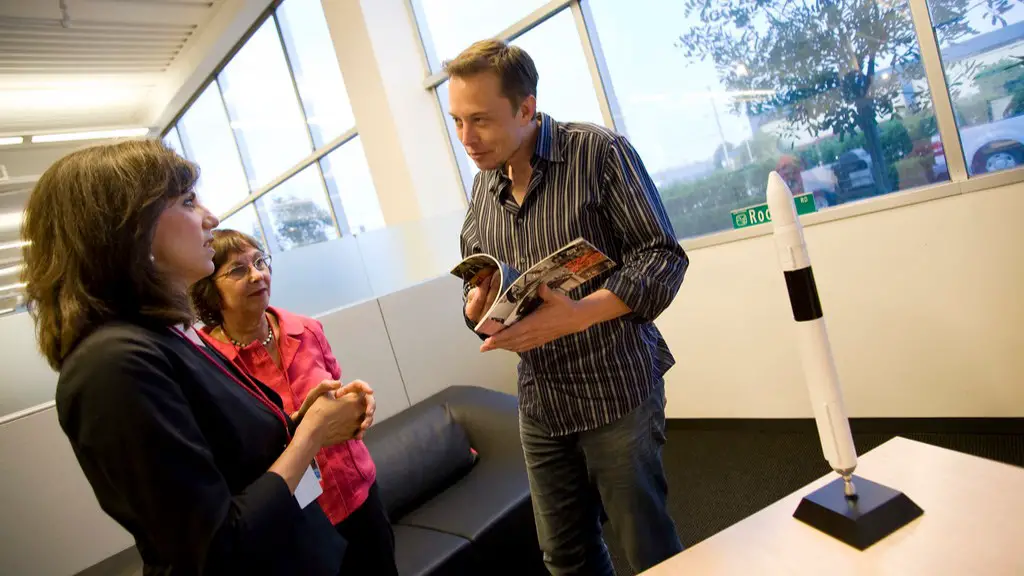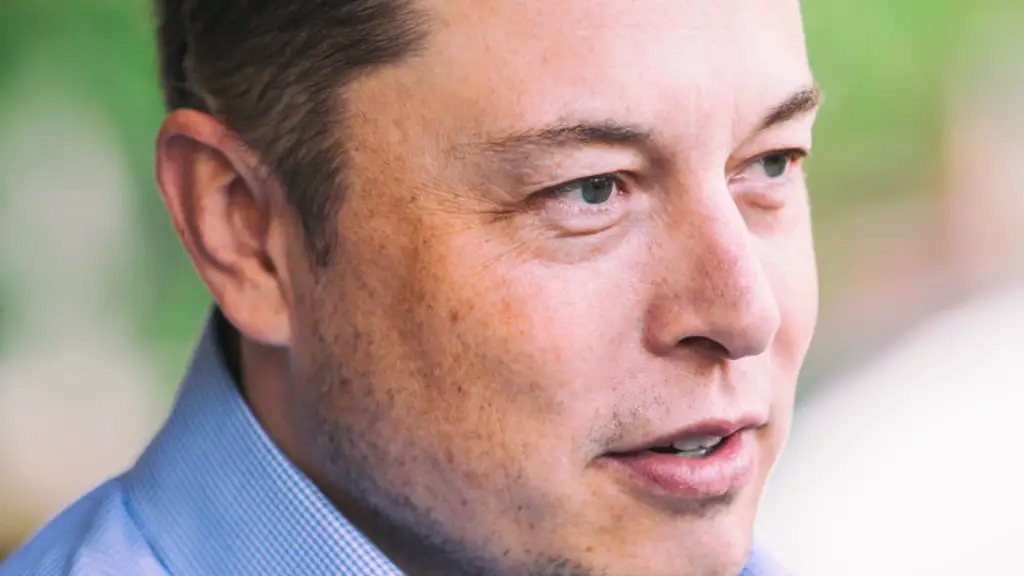Elon Musk is an inventor, leader, and innovator in many fields. He has been credited for founding a number of companies, including X.com, Tesla, and SpaceX, and for creating an online payment system that was purchased by PayPal. He has also made strides in space exploration, with the goal of sending humans to Mars in the near future. In this article, we will look at how Elon Musk wants to colonize Mars and what that could mean for the future of humanity.
The concept of colonizing Mars has been around for decades, but Elon Musk has taken it one step further. He plans to send thousands of people to live on Mars, terraforming the planet in the process. This would involve turning the Martian atmosphere into one that is similar to Earth’s, with oxygen, water, and other gases. To do this, Elon Musk aims to build a giant spacecraft system with multiple rockets. He also plans to build special habitats with artificial gravity, enabling the astronauts to live comfortably on the red planet.
The colonization of Mars would bring about incredible possibilities for research, development, and exploration. It could also provide an opportunity for humanity to escape an uninhabitable Earth in the future. Elon Musk has stated his belief that humans must become a “multi-planet species” in order to survive, and Mars could be the perfect place for this to occur. It could also be the ultimate destination for people who want to explore and experience new worlds.
Elon Musk’s ambitious plan to colonize Mars has attracted both criticism and praise. Critics say that his plans are unrealistic and expensive, noting that the costs of traveling and living in space would be tremendous. Others point out the dangers of the mission, such as the difficulty of traveling between planets and the possible health risks posed by the environment. Proponents of the mission have argued that it could yield incredible advances in many areas, from communications technology to space exploration.
Scientists and engineers around the world have lent their expertise to the project. They have proposed a variety of methods for colonizing Mars, such as developing sustainable farming techniques, creating artificial biospheres and habitats, and developing spacecraft to travel between planets. Many experts have concluded that Elon Musk’s plan is achievable, but require extensive planning, development, and funding. They have urged governments and private organizations to invest in the mission to ensure its success.
Elon Musk’s plan to colonize Mars is bold and ambitious. It is a project that could have a profound impact on humanity and the future of space exploration. But as with any venture of this scale and complexity, there are numerous risks and challenges that need to be addressed. To ensure its success, strong leadership, technical expertise, and financial resources must all be brought together.
Additional Benefits
Colonizing Mars could bring about a variety of benefits to humankind. In addition to the technological advances and exploration opportunities it could yield, it could also create new sources of energy. Due to its distance from the Sun, Mars receives less solar radiation. This means that solar power is more practical on the planet, which could lead to the development of efficient and sustainable sources of energy for travelers and settlers.
The colonization of Mars could also be beneficial for earthbound citizens. Research conducted on the planet could yield insights into our history and the origins of life. It could also teach us about ourselves, as humans may have to adapt to survive and thrive on Mars. Even if the mission fails, the knowledge and experience gained from the endeavor could lead to the development of new technologies and processes on Earth.
The scientific challenges of living on Mars can also provide unique opportunities for experimentation and development. Instead of relying on existing methods and technologies, researchers could push the boundaries of biology, physics, and engineering to create something new. This could yield vast improvements in our understanding of the universe, and in the technologies and processes used on Earth.
Finally, colonizing Mars could give humanity a new perspective on our place in the universe. It could bring about a feeling of unity and solidarity, as people share the same goal of establishing a new home on a planet millions of miles away from Earth. It could also create a greater understanding of our impact on the environment, and help us focus on taking better care of our planet.
Challenges
One of the main challenges of establishing a colony on Mars is the harsh living conditions the settlers would face. The environment of Mars is vastly different from that of Earth, meaning that those traveling to the planet must be prepared for the extreme temperatures, radiation exposure, and microgravity. It would also be difficult for the settlers to adjust to life in such a hostile environment, as their bodies would have to adapt to the new conditions.
The cost of colonizing Mars is also a major problem. Elon Musk has estimated that the mission could cost $10 billion, a figure that rises significantly when accounting for the expenses of travel and living on the planet. This price tag is considerable, and means that the project would have to be funded by governments, organizations, and wealthy individuals.
Finally, there is the risk of something going wrong. Space is a high-risk environment, and any mistake could lead to the loss of life. This can make colonizing Mars a high-stakes proposition, and one that many are hesitant to undertake. But if done properly, the mission could bring about huge rewards for humanity.
Preparing for Takeoff
Elon Musk’s goal to colonize Mars is a monumental task, one that has attracted skeptics as well as supporters. It will require a significant amount of planning, organizing, and funding, but if done correctly it could yield incredible advances in science, technology, and human exploration. Before the mission can begin, however, much work needs to be done. Engineers must find ways to make space travel safer, scientists must create self-sustaining habitats for the settlers, and the settlement must be funded. This may be a long and arduous process, but the potential rewards make it a worthwhile endeavor.
It is also important to remember that colonizing Mars will not be a solo effort. Many countries, companies, and individuals will need to work together to make the project a success. This could involve pooling resources and forming partnerships, with each participant contributing their expertise and resources to the mission. Without cooperation, Elon Musk’s ambitious dream of traveling to Mars may never become a reality.
Developing New Technologies
In order to colonize Mars, many new technologies must be developed. This includes the creation of a powerful rocket system and habitats that can maintain comfortable temperatures and air pressure. It also involves the development of new communication and navigation systems, as well as the creation of robotic drones and vehicles to explore the planet. All of these technologies must be tested and perfected before they can be implemented on a large scale.
The development of technologies also involves economic decisions. Companies must determine which projects should be funded, as well as how much money these projects should receive. Governments have a role to play in this process as well, as they provide the infrastructure and regulatory framework for these operations. All of these decisions will come down to cost and risk, so it is important that projects are well-researched and designed with the future in mind.
Finally, it is also important to remember that the colonization of Mars is not a single endeavor. It is a long-term project that will require consistent effort and dedication from all involved. This means that everyone must work together to ensure that the mission is successful, from the scientists researching and designing the technologies to the explorers setting out on the journey.
Human Resistance
One of the obstacles that must be overcome on the path to colonizing Mars is human resistance. Some people fear that an interstellar mission could be dangerous and may not be worth the risk of life and resources. Others may take issue with the idea of leaving behind the home they have always known to venture out into the unknown. It is also possible that there could be religious objections to the mission, as some may consider it blasphemous to colonize another planet.
To combat this opposition, it is important that everyone involved in the mission understands the potential risks and benefits of colonizing Mars. Education and information campaigns can be implemented to ensure that people have access to the facts and figures associated with the mission. By understanding the scope of the project, people may become more comfortable with the idea of colonizing Mars.
Elon Musk’s plans for colonizing Mars have generated intense interest and debate. There is no question that the mission is both risky and expensive, but it also offers incredible possibilities for humanity. With the right leadership, planning, and resources, it is possible that Elon Musk’s dream of establishing a colony on Mars may soon become a reality.
Making Mars Habitable
In order to colonize the red planet, it must first be made habitable. This involves complex and delicate engineering and construction, as any mistake could lead to disaster. It would also require the development of artificial biospheres to provide the necessary resources to sustain human life. This could include creating a breathable atmosphere and edible food stocks to keep the colonists healthy and well-fed.
Achieving habitability on Mars is no small task. It requires knowledge and expertise from a variety of fields, from environmental science and engineering to economics and politics. Teams of experts would need to be assembled to handle the complexities of constructing and maintaining a new home, as well as to provide support for those living on the planet. This could involve recruiting additional personnel, assembling teams to work on various projects, and providing guidance to the settlers.
The process of making Mars habitable would also require substantial resources. Materials would need to be sourced to construct habitats, create drones and robots to explore the planet, and establish a functioning infrastructure. These materials would need to be both durable and lightweight, as the cost of transportation from Earth is one of the biggest obstacles to colonizing Mars. Additionally, sources of energy must also be developed to power the colonies. This could involve finding renewable and sustainable sources, such as solar and wind, or building nuclear reactors.
Finally, in order for humans to survive on Mars, the planet must be made secure. This could involve constructing protective walls or domes to ward off potential threats from outer space, or developing systems to monitor and defend the planet from asteroids and other hazardous objects. All of these tasks are essential in creating a safe and sustainable colony on Mars.
Conclusion
Elon Musk’s plans to colonize Mars are bold and ambitious. From developing spacecrafts and habitats to making the planet habitable, there are numerous challenges that need to be overcome. But if done correctly, the mission could bring substantial rewards and advancement in our understanding of the universe. With strong leadership, technical expertise, and financial resources, it is possible that Elon Musk’s dream of colonizing Mars could soon become a reality.




